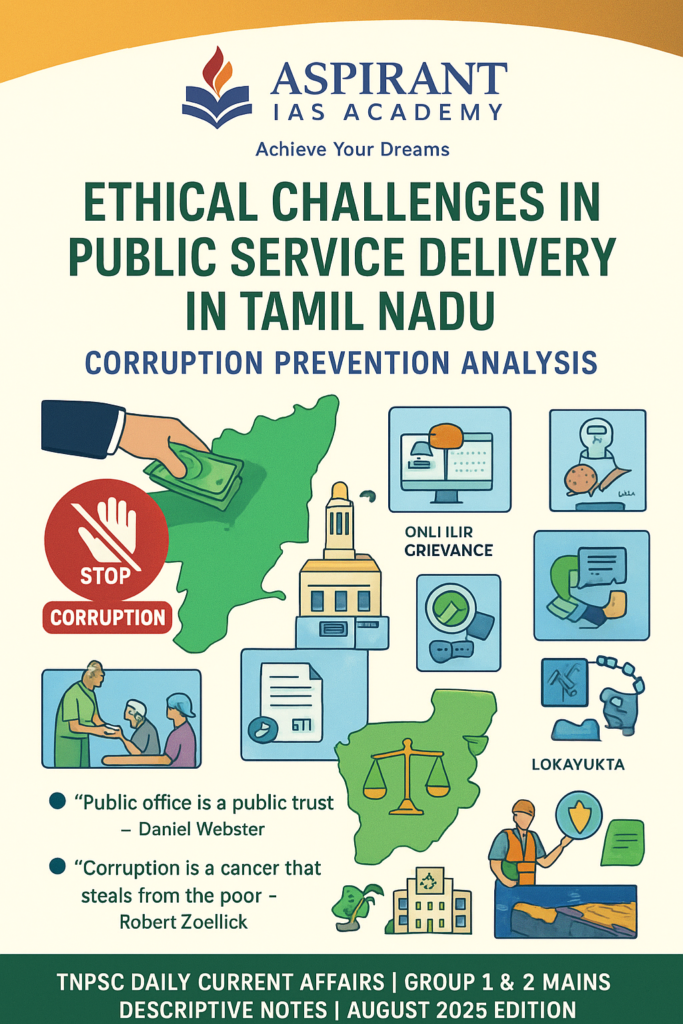
“Public office is a public trust” – Daniel Webster
I. Ethical Challenges in Service Delivery
Systemic Issues
- Bureaucratic Corruption: Speed money demands in routine services like licenses, certificates, land records
- Political Interference: Transfer postings based on political considerations, policy implementation delays
- Nepotism and Favoritism: Recruitment irregularities, contract allocations to preferred vendors
- Accountability Deficit: Weak grievance redressal, lack of performance monitoring in rural areas
Service-Specific Challenges
- Revenue Administration: Land grabbing, fraudulent documentation, delay in property registrations
- Welfare Scheme Implementation: Ration card fraud, NREGA wage theft, scholarship disbursement delays
- Public Works: Quality compromise in infrastructure projects, cost escalations, environmental clearance violations
- Healthcare Services: Absenteeism in primary health centers, medicine shortages, preferential treatment
“Corruption is a cancer that steals from the poor, eats away at governance” – Robert Zoellick
II. Tamil Nadu’s Corruption Prevention Framework
Institutional Mechanisms
- Tamil Nadu Vigilance and Anti-Corruption Bureau: Investigation of corruption cases, trap operations
- Lokayukta Institution: Ombudsman role in grievance redressal, administrative oversight
- Central Vigilance Commission: Coordination with state agencies, integrity pacts for major projects
- Right to Information Act: Transparency enhancement, citizen empowerment through information access
Digital Governance Initiatives
- e-Sevai Centers: Online service delivery reducing human interface, standardized processing time
- Aadhaar Integration: Direct benefit transfers eliminating intermediaries in welfare schemes
- Tamil Nadu e-Governance Agency: Digital infrastructure development, process automation
- Mobile Applications: Citizen grievance portals, real-time service tracking systems
Policy Reforms
- Single Window Clearances: Simplified approval processes, time-bound clearances for industries
- Performance Management: Result Framework Documents, citizen feedback integration
- Whistleblower Protection: Anonymous complaint mechanisms, protection for informants
- Asset Declaration: Mandatory for public servants, online publication for transparency
III. Assessment and Way Forward
Success Stories
- PDS Reforms: Technology integration reducing ghost beneficiaries, improved grain distribution
- Revenue Digitization: Land records computerization, reduced litigation, faster services
- Procurement Transparency: e-tendering systems, competitive bidding processes
Persistent Challenges
- Implementation Gaps: Urban-rural disparity in service quality, capacity constraints in remote areas
- Cultural Factors: Gift-giving traditions conflicting with anti-corruption norms
- Enforcement Limitations: Delayed prosecutions, inadequate punishment deterrence
Recommendations
- Ethics Training: Regular integrity workshops for public servants, value-based recruitment
- Citizen Engagement: Social audits, community monitoring, feedback-based performance evaluation
- Technology Enhancement: Blockchain integration, AI-powered fraud detection, seamless digital services
“The strength of a nation derives from the integrity of the home” – Confucius
Conclusion
Tamil Nadu has established comprehensive anti-corruption framework through digital governance and institutional reforms. However, addressing ethical challenges requires sustained efforts in capacity building, citizen participation, and cultural transformation to ensure transparent, accountable public service delivery meeting citizen aspirations.
Post Views: 384
